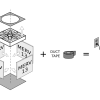Updated July 6 at 4:11 p.m.
Every week, Frankie Campofelice belts out showtunes with pianist Andy Lantz to kick off a lively open mic night at Club Café’s Napoleon Room. The room in the South End gay club seats about 40 people for drinks, dinner and a cabaret performance. When the pandemic first hit in 2020, Campofelice says things really came to a halt.
"Obviously, once COVID started, all indoor performances basically ceased," Campofelice said at a break during a recent performance. "And then there was a while here, you know, where they had like plexiglass in between all of the tables."
But he said things started to feel closer to normal in the Napoleon Room last winter, thanks to new technology that may have made it one of the most COVID-safe performance venues in the world. And it could be a model for other kinds of indoor venues.
On the ceiling of the Napoleon Room are seven devices shining ultraviolet light down on the room that clear the air of floating viruses.
Ed Nardell, a professor at Harvard Medical School, arranged for the donation and installation of the devices. He’s also an amateur cabaret singer and a regular at Club Café’s open mic nights.
"As someone who comes here frequently, I thought that we probably could do something to make it safer for people who are going to be taking off their masks to eat, drink and sing," Nardell said.

Using ultraviolet light to decontaminate rooms is not new. Back in the 1980s, Nardell was installing and researching UV lights for reducing the spread of tuberculosis. And during the pandemic, many public venues have installed UV systems. But those units are designed to only disinfect air at the ceiling level, because exposing people to UV light can cause skin and eye damage.
"But wouldn't it be nice if we could actually directly inactivate microbes, bacteria and viruses right where we're standing, right at the same level where you and I are present?" asked Columbia University professor David Brenner before a recent cabaret performance at the venue.
Brenner has been researching a new approach called Far UVC , which is what is being used in the Napoleon Room. It uses a shorter wavelength of ultraviolet light and his research shows that it's safe for humans.
"It can't penetrate into the living cells and our skin, can't penetrate into the living part of our eye," Brenner said.
Brenner has found it's safe and effective at killing any viruses floating around.
"What these are doing is producing kind of a cone of energy that comes down and pretty much at table level covers much of the surface and a good portion of the air in the room," Nardell explained.
Even though the "cones" don't cover the entire room, Nardell said the air circulates through, passes under them and becomes almost completely disinfected.
But he acknowledged the technology does have its drawbacks. The system for the relatively small Napoleon Room would have cost about $16,000, including installation, if it hadn’t been for the donations.
"Its cost at the moment is high and its availability isn't as great as the older UV [systems]," Nardell said. "But little by little, those are likely to be solved."’

Open mic night regular Pamela Enders says there's nowhere else in Boston like the Napoleon Room, and that she apreciates extra level of protection.
"For somebody who likes to sing and listen to singers, this is heaven," she said. "And the fact that these UV systems have been put in makes it safer for all of us. So I'm so grateful that that has happened."
There haven’t been any known COVID-19 outbreaks traced to the club since the lights were installed in February.
Over time, Nardell said, he hopes to see Far UVC become a much more common technology, making all kinds of public spaces as safe as the Napoleon Room.
Correction: A previous version misstated the frequency of the Napoleon Room's open mic nights.








